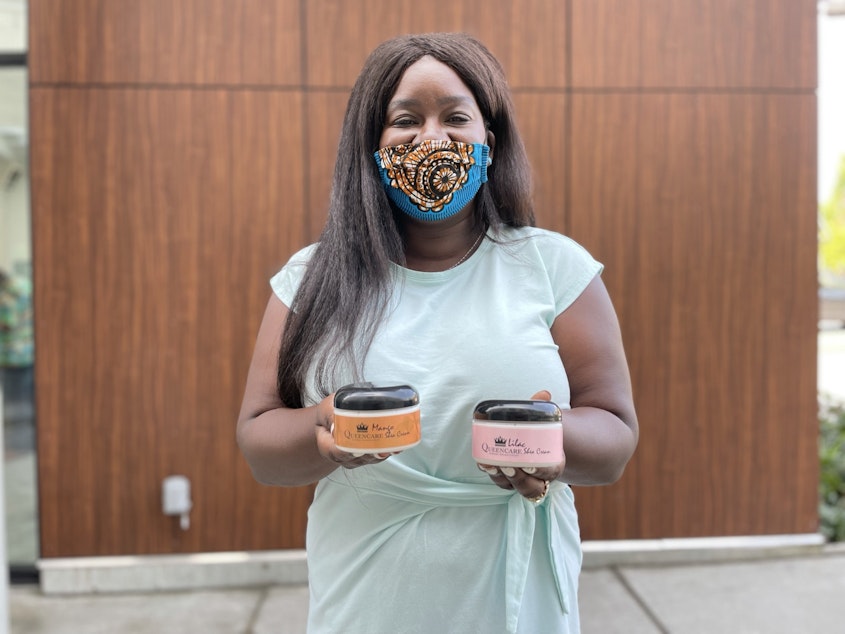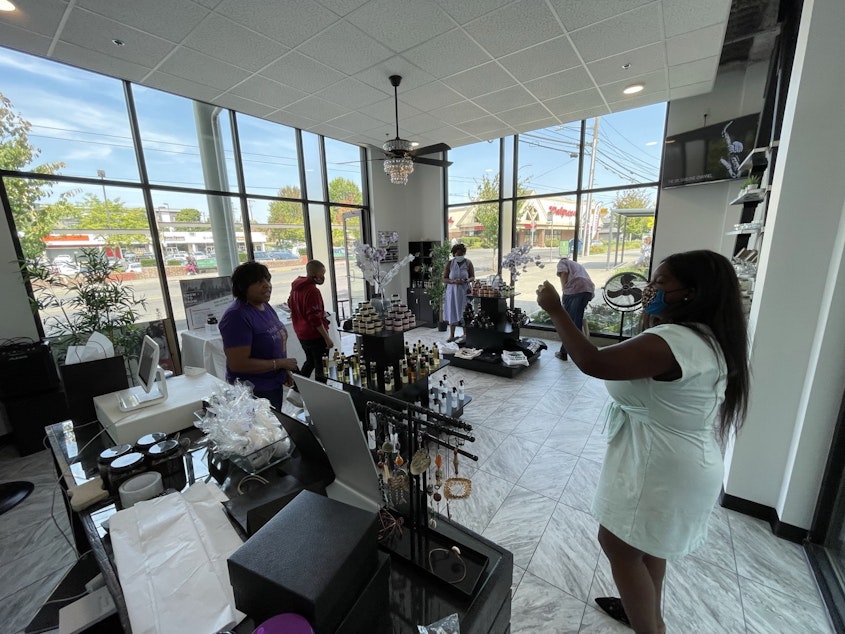How community pressure helped rebuild Black-owned businesses in Seattle's Central District

When Paul Allen’s development company, Vulcan, bought a strip mall and a grocery store in the Central District years ago –many residents had concerns.
The community did not want to become like another neighborhood Vulcan redeveloped: South Lake Union. So the neighborhood pushed back.
That resistance shaped the intersection of 23rd and Jackson today.
Monika Mathews runs a store called Queencare. They sell skin care and aromatherapy products. But it’s more than a store. “Queencare was actually born out of my nonprofit work. I started an organization 20 years ago," Mathews said.
Mathews' nonprofit organization, Life Enrichment Group, teaches young people of color how to be entrepreneurs. They get real world training in this store. “They learn about business management, inventory control, and how to run their own business if they so choose,” said Mathews.
The location of this shop at 23rd and Jackson means a lot to Mathews. “Jackson Street was where I grew up. I mean, this area where we’re standing is where I used to get my hair done, a long time ago.”
In recent years, a lot of Black-owned businesses have been pushed out of this area by redevelopment and rising rents. Near this corner in particular, there were Black-owned clothing stores, restaurants, and a flower shop.
RELATED: Seattle's Central District divided over new Amazon Fresh store
Sponsored
Mathews hopes that her store, along with other companies coming to the same corner, will help rebuild some of what has been lost. “We really just want to revive the culture that is the history of this very location.”
This intersection of is full of foot traffic, and Mathews’ store is highly visible in the center of a public plaza at the foot of a massive new apartment building. It’s a good place for any establishment to be.
Mathews says she was able to afford the rent because of things leaders in her community did half a decade ago.

Vulcan moves into the neighborhood
I want to take you back to a stuffy basement room in the summer of 2016. It’s a hot day, and members of the community are sitting in front of electric fans trying to stay cool. Vulcan’s architects have just talked about what they’re going to build after they tear down the old Red Apple Market and the strip mall next door. Some neighbors planned to fight to the developer's vision. But others promoted a different approach. They challenged Vulcan to do better.
Joe Stanton, leader of the Central Area Youth Association, was one of those voices. He stood in front of one of the fans and addressed the tension in the room. “I know everybody’s kind of apprehensive. I mean, it’s a big development," he said. "But I think, honestly, you guys, that things can work. But we have to work with them, and put our input in. If you don’t put your input in, whatever happens, happens.”
During that summer, I also interviewed Ada Healey about the project. She’s the head of Vulcan Real Estate. “Well, our goal is to create a model for inclusive growth and to really embrace what we’ve heard, feedback from the community.”
Vulcan changed its design over time. The result is the project that’s open today at 23rd and Jackson. Along the sidewalk are a handful of retail spaces, including some really small ones — micro-retail spaces.
Vulcan is filling them with Black-owned businesses, including a plant store called Boosh, a restaurant called Simply Soulful, and Monika Mathews’ shop, Queencare. “They came up with a sweet deal to offer this space, with subsidized rent," Mathews said. "And so, I totally was able to benefit from that.”
Sponsored
I wanted to know what Joe Stanton, the guy who stood up at that meeting years ago, thought of Vulcan’s project today. So I called him up. “Everything they said to me, and everything they said about what they were going to try to do in the community – to me, it seems like they have done that,” Stanton said.
Not everybody is so satisfied. Lois Martin runs a preschool nearby. She says there’s not enough seniors living in the apartments on the property. She misses the Red Apple market, which used to stock special ingredients to appeal to Black customers from the South. And she’s worried about the small businesses that had to relocate when the project went in.
“There were a number of those small businesses that have not returned to that space," Martin said. "I remember there was a clothing - a couple of clothing stores in there.”
Related stories from the KUOW Archives:
On the site where those establishments used to be, Monika Mathews of Queencare says she’s standing on the shoulders of people who pushed Vulcan and kept pushing until the building finally opened.
“The people that advocated – during the Red Apple times – is the reason why I’m here now," Mathews said. "Because of their advocacy, Vulcan listened. And I think that is huge. Because a lot of times, corporations don’t listen.”
Now that Mathews has opened this store, she hopes to open up other locations too. With more Queencare stores, she can train more young people how to make money, so that more young Black entrepreneurs can afford to live in the neighborhood.




